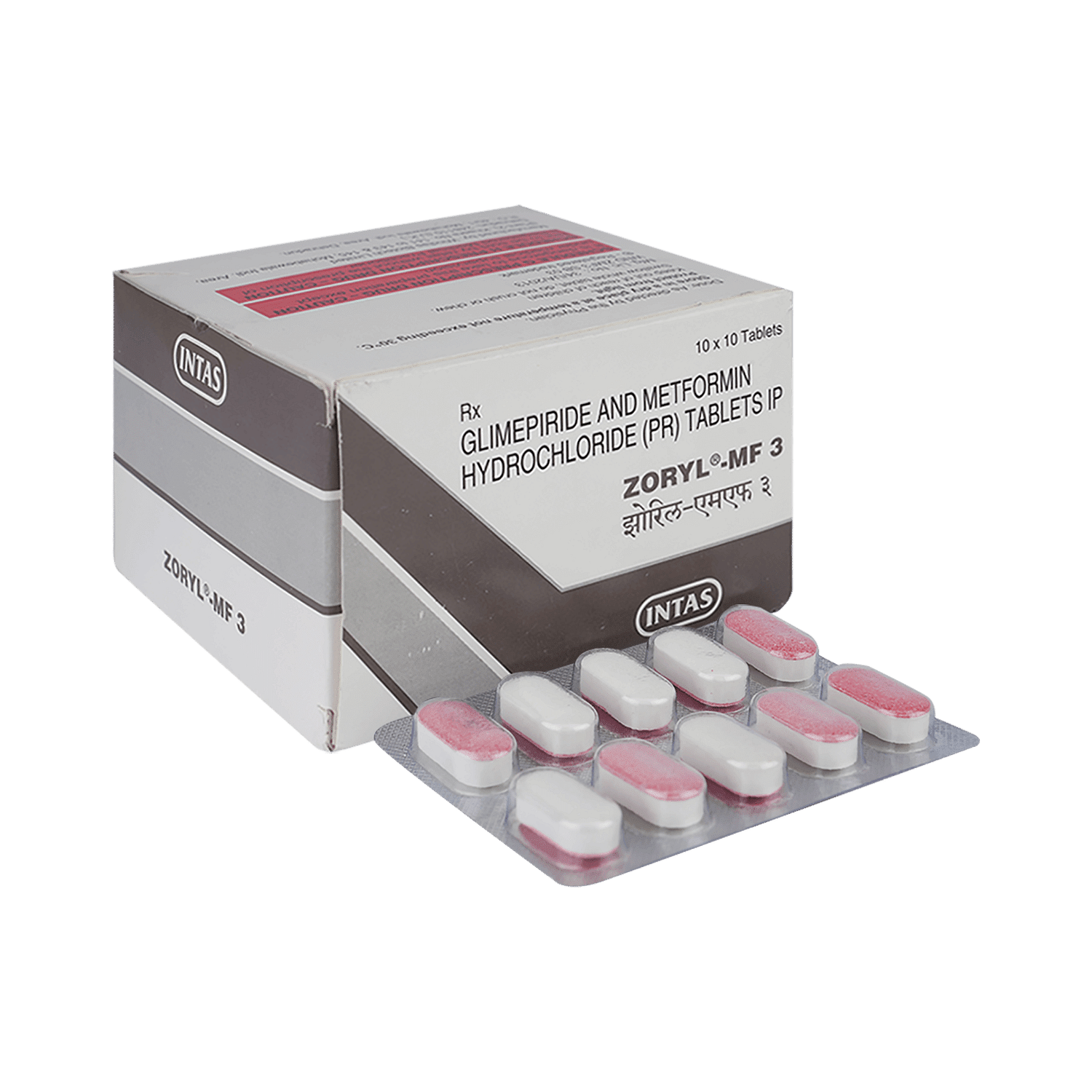
Gride M 3mg/850mg Tablet
Manufacturer
East West Pharma
Salt Composition
Glimepiride (3mg) + Metformin (850mg)
Key Information
Short Description
Gride M 3mg/850mg Tablet is a combination of two medicines used to treat type 2 diabetes mellitus in adults. It helps control blood sugar levels in people with diabetes.
Dosage Form
Tablet
Introduction
Gride M 3mg/850mg Tablet belongs to a category of medicines known as anti-diabetic drugs. It is a combination of two medicines used to treat type 2 diabetes mellitus in adults. It helps control blood sugar levels in people with diabetes.
Directions for Use
Take this medicine in the dose and duration as advised by your doctor. Swallow it as a whole. Do not chew, crush or break it. Gride M 3mg/850mg Tablet is to be taken with food.
Safety Information
Side Effects
It can cause hypoglycemia (low blood sugar level) when used with other antidiabetic medicines, alcohol or if you delay or miss a meal.
Alcohol Warning
It is unsafe to consume alcohol with Gride M 3mg/850mg Tablet.
Breastfeeding Warning
Gride M 3mg/850mg Tablet is unsafe to use during breastfeeding. Data suggests that the drug may cause toxicity to the baby.
Pregnancy Warning
Gride M 3mg/850mg Tablet may be unsafe to use during pregnancy. Although there are limited studies in humans, animal studies have shown harmful effects on the developing baby. Your doctor will weigh the benefits and any potential risks before prescribing it to you. Please consult your doctor.
How it works
Gride M 3mg/850mg Tablet is a combination of two antidiabetic medicines: Glimepiride and Metformin. Glimepiride is a sulfonylurea which works by increasing the amount of insulin released by the pancreas in order to lower the blood glucose. Metformin is a biguanide which works by lowering glucose production in the liver, delaying glucose absorption from intestines and increasing the body's sensitivity to insulin.
Quick Tips
You should continue to exercise regularly Eat a healthy diet Take your other diabetes medicines along with Gride M 3mg/850mg Tablet. Take it with food to lower your chance of having an upset stomach. Monitor your blood sugar level regularly while you are taking this medicine.
Related Medicines

Glitaray M3 Plus 3mg/850mg Tablet

StayHappi Glimepiride+Metformin 3mg/850mg Tablet

Glimzen M 3mg/850mg Tablet

Glitaray M Plus 3mg/850mg Tablet

Zoryl MF 3 Tablet

Gemer Forte 3mg/850mg Tablet
Frequently asked questions
What are the proper storage conditions for Gride M 3mg/850mg Tablets?
Store Gride M 3mg/850mg Tablets in their original container, tightly closed, and according to the instructions on the pack or label. Dispose of unused medicine properly.
Can Gride M 3mg/850mg Tablet use lead to lactic acidosis?
Yes, using Gride M 3mg/850mg Tablets can lead to a medical emergency called lactic acidosis (MALA). It is caused by high levels of lactic acid in the blood and is more likely in patients with kidney disease, elderly individuals, or those who consume large amounts of alcohol. Symptoms include muscle pain or weakness, dizziness, tiredness, feeling cold in arms and legs, difficulty breathing, nausea, vomiting, stomach pain, or a slow heart rate. If you experience these symptoms, stop taking Gride M 3mg/850mg Tablets and consult your doctor immediately.
What is Gride M 3mg/850mg Tablet?
Gride M 3mg/850mg Tablet is a combination medication consisting of Glimepiride and Metformin. It is used to treat type 2 diabetes mellitus (DM) in adults, improving blood glucose levels when taken with a proper diet and regular exercise. This combination does not indicate the treatment of type 1 DM.
What are the possible side effects of Gride M 3mg/850mg Tablet?
Common side effects associated with Gride M 3mg/850mg Tablets include hypoglycemia (low blood sugar), altered taste, nausea, stomach pain, diarrhea, and headache. Rare but serious side effects include lactic acidosis and Vitamin B12 deficiency on long-term use.
Can the use of Gride M 3mg/850mg Tablet lead to Vitamin B12 deficiency?
Yes, using Gride M 3mg/850mg Tablets can cause Vitamin B12 deficiency on long-term use. This is due to interference with Vitamin B12 absorption in the stomach. Untreated, it may result in anemia and nerve problems, including tingling sensations and numbness in hands and feet, weakness, urinary issues, changes in mental status, and balance difficulties.
Can the use of Gride M 3mg/850mg Tablet cause hypoglycemia?
Yes, using Gride M 3mg/850mg Tablets can lead to low blood sugar levels (hypoglycemia). Symptoms include nausea, headache, irritability, hunger, sweating, dizziness, a fast heart rate, and feelings of anxiety or shakiness. Hypoglycemia is more likely when food is missed or delayed, alcohol is consumed, over-exercising occurs, or other antidiabetic medicines are taken alongside Gride M 3mg/850mg Tablets.
Is it safe to take alcohol while taking Gride M 3mg/850mg Tablet?
No, it is not safe to consume alcohol while taking Gride M 3mg/850mg Tablets, as it may lower blood sugar levels and increase the risk of lactic acidosis.


